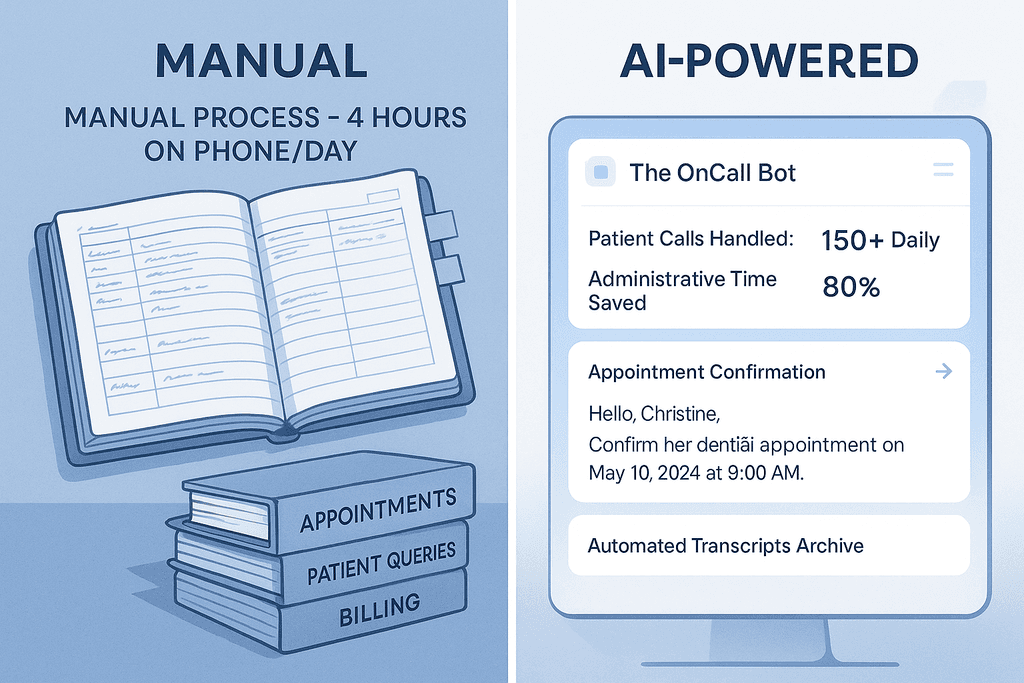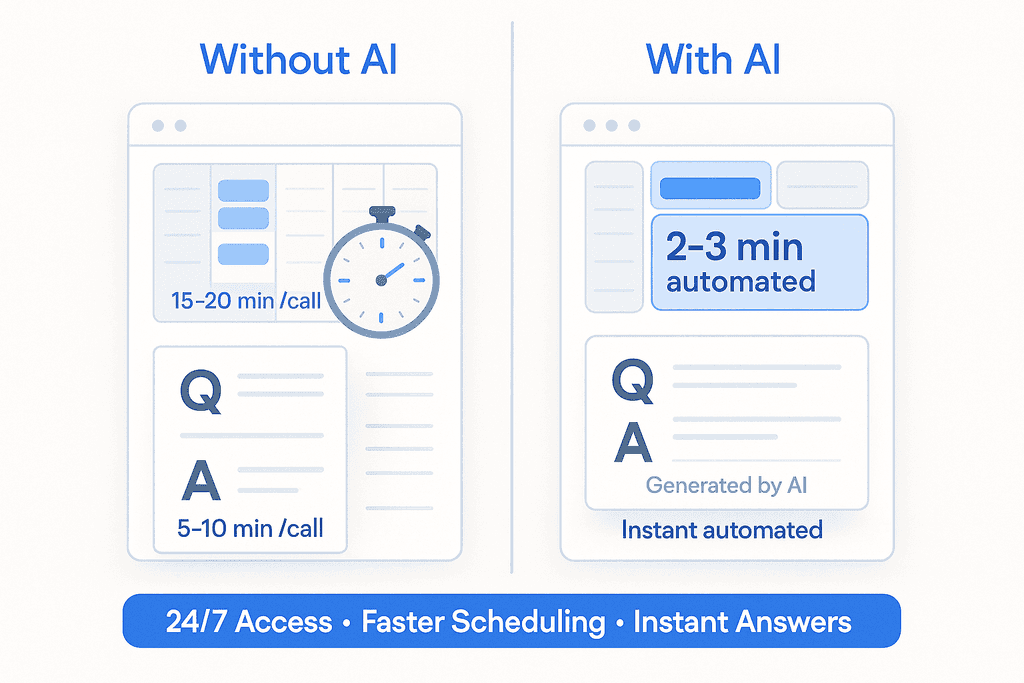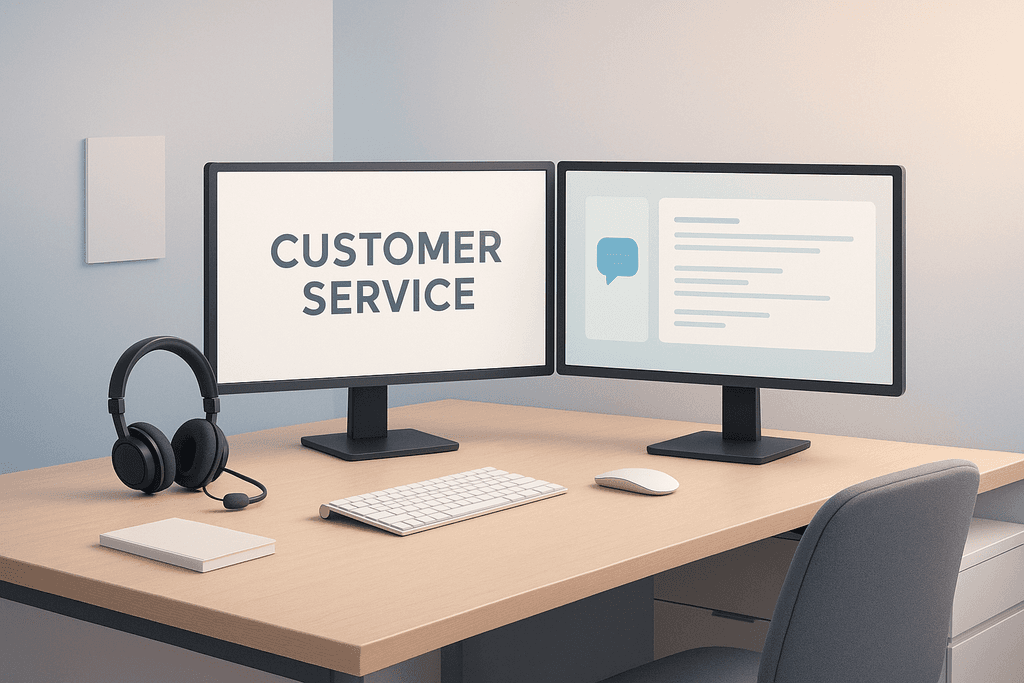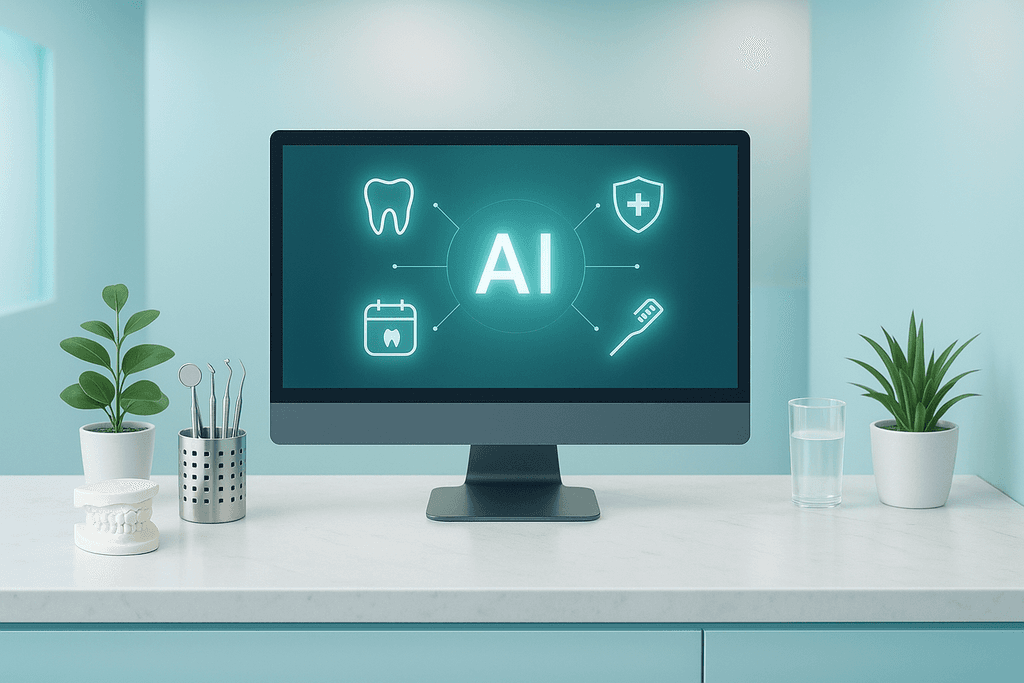Dental receptionists spend up to 70% of their time on repetitive tasks like scheduling and answering basic questions. AI dental front desk assistants are revolutionizing this workflow, handling routine inquiries 24/7 while freeing up staff for more complex patient care. Solutions like The OnCall Bot are helping modern clinics boost efficiency and patient satisfaction without breaking the bank.
Table of Contents
The Evolution of Dental Front Desk Management
Dental practices handle an average of 150 patient calls per day, with front desk staff spending up to 4 hours daily on the phone. This high volume of communication has long been a challenge for dental offices, impacting both efficiency and patient satisfaction.

Traditionally, dental front desks relied on manual processes to manage appointments, answer patient queries, and handle billing. These methods often led to:
- Long wait times for patients on hold
- Missed calls during busy periods or after hours
- Scheduling errors and double-bookings
- Staff burnout from repetitive tasks
As technology advanced, dental practices began adopting digital solutions to streamline operations. Practice management software helped organize patient records and scheduling, while automated reminder systems reduced no-shows. However, these tools still required significant human oversight and didn’t address all front desk challenges.
The emergence of AI in healthcare has opened new possibilities for dental front desk management. AI-powered virtual assistants can now:
- Handle multiple patient interactions simultaneously
- Provide instant responses to common questions
- Schedule appointments without human intervention
- Offer 24/7 availability for patient support
These capabilities are transforming how dental practices operate, freeing up staff to focus on more complex tasks and improving patient experience. For example, AI dental receptionists can help practices reclaim valuable time by automating routine front desk duties.
As dental practices continue to evolve, AI front desk assistants are becoming an essential tool for modern clinics looking to boost efficiency and patient satisfaction. The OnCall Bot, for instance, offers 24/7 support and personalized responses to enhance dental practice operations.
| Task | Time Saved per Day |
|---|---|
| Answering routine questions | 2 hours |
| Scheduling appointments | 1.5 hours |
| Managing patient records | 1 hour |
Key Features of AI Dental Front Desk Assistants
AI dental front desk assistants are changing how dental offices handle patient communication and scheduling. These smart tools work around the clock to help both patients and staff.
Here are some of the main things AI assistants can do:
- 24/7 availability – Patients can get help anytime, even after hours
- Automated scheduling – Book appointments without calling the office
- Quick answers – Respond to common questions instantly
- Integration with office systems – Work smoothly with existing software
These features free up staff time and make things easier for patients. No more phone tag or long waits to schedule a cleaning.
AI assistants can handle routine tasks, letting human staff focus on more complex work. This leads to a smoother-running office overall.

Enhancing Patient Experience with AI Assistants
AI front desk tools do more than just answer phones. They can actually improve how patients interact with dental offices.
Some key benefits for patients include:
- Shorter wait times for appointments
- 24/7 access to information and scheduling
- Personalized communication based on their history
- Easier access for those with special needs
AI assistants remember patient preferences and past visits. This allows them to provide tailored information and reminders.
For example, a patient with anxiety might get extra reassurance before an appointment. Someone due for a cleaning could get a gentle nudge to schedule.
- Faster responses to questions
- Less time spent on hold
- More convenient scheduling options
These improvements can lead to happier patients who are more likely to keep up with their dental care. Studies show that easier access to care leads to better oral health outcomes.

Boosting Clinic Efficiency and Staff Productivity
AI front desk assistants don’t just help patients – they’re a big boost for dental office staff too. By handling routine tasks, they free up humans to focus on more important work.
Here’s a look at how AI can improve office efficiency:
| Task | Without AI | With AI |
|---|---|---|
| Appointment scheduling | 15-20 minutes per call | 2-3 minutes automated |
| Answering basic questions | 5-10 minutes per call | Instant automated response |
| After-hours availability | Limited or none | 24/7 access |
These time savings add up quickly. Staff can use that extra time to improve patient care, handle complex issues, or take on other valuable tasks.
AI assistants also reduce human error in scheduling and record-keeping. This means fewer missed appointments and billing mistakes.
The result? A more efficient office that can see more patients without burning out staff. It’s a win-win for everyone involved.
Our product, The OnCall Bot, offers these efficiency boosts and more. It integrates smoothly with existing systems to enhance your current workflow, not disrupt it.
By automating routine front desk work, dental offices can focus on what really matters – providing great care to patients. The technology is here to help, not replace, skilled dental staff.

The Future of AI in Dental Practice Management
AI dental front desk assistants like The OnCall Bot are just the beginning of how artificial intelligence will reshape dental practices. As these technologies evolve, we’re likely to see even deeper integration with other dental systems and workflows.
Here are some key ways AI is poised to advance dental care:
- Smarter scheduling that predicts appointment lengths and reduces gaps
- Automated insurance verification and claims processing
- Personalized treatment plan recommendations based on patient history
- Early detection of potential issues through pattern recognition in records
While AI assistants currently focus on administrative tasks, future versions may work alongside dentists in clinical capacities. Imagine AI analyzing x-rays in real-time or guiding robotic tools during procedures.
Of course, implementing AI in healthcare settings comes with challenges:
- Ensuring patient data privacy and security
- Gaining patient trust in AI-assisted care
- Keeping human oversight to prevent over-reliance on automation
- Regularly updating AI models with the latest dental research
Dental practices that embrace AI tools thoughtfully stand to gain major efficiency boosts. For example, case studies show AI solutions improving both efficiency and patient satisfaction in forward-thinking clinics.
As AI capabilities grow, so will opportunities to enhance patient care. The key is finding the right balance of human expertise and AI assistance. Tools like The OnCall Bot offer an accessible starting point, letting practices dip their toes into AI-powered efficiency without a massive overhaul.
Wrap-up
AI dental front desk assistants are changing how modern clinics operate. They handle routine tasks, freeing up staff to focus on patient care. This tech boost can give your practice an edge.
But it’s not about replacing humans. The goal is to blend AI efficiency with a personal touch. Patients still want to connect with real people for complex issues. Finding that sweet spot is key.
Ready to explore AI for your dental office? Start small. Maybe try out a call automation feature first. See how it fits your workflow. Then gradually add more AI tools as you get comfortable.
Remember, the dental world keeps evolving. Staying current with tech like AI assistants helps you adapt. It’s about working smarter, not harder. And that’s good for both your team and your patients.
Curious about specific ways AI can help your practice? Check out our AI call automation guide for practical tips. Or browse our features page to see how The OnCall Bot tackles common dental office challenges.
Common Questions About AI Dental Front Desk Assistants
How much does an AI dental assistant cost?
AI dental assistants typically range from $50 to $200 per month, depending on features. The OnCall Bot, for example, costs $49.99 monthly after a one-time setup fee. Many practices find the ROI significant due to reduced staff workload and improved patient engagement.
Is patient data secure with AI assistants?
Yes, reputable AI dental assistants prioritize data security. They use encryption, comply with HIPAA regulations, and often store data on secure cloud servers. It’s important to choose a provider that openly discusses their security measures.
Do staff need special training to use AI assistants?
Most AI dental assistants are designed to be user-friendly. Basic training is usually provided during setup, which typically takes a few hours. Staff often find these tools intuitive and easy to incorporate into their daily workflows.
Can AI assistants handle complex patient inquiries?
AI assistants excel at handling routine questions and tasks. For more complex inquiries, they’re programmed to escalate to human staff. This ensures patients always receive appropriate care while freeing up staff time for nuanced situations.
How do AI assistants improve patient experience?
AI assistants offer 24/7 availability, quick responses, and consistent information. They can schedule appointments, answer FAQs, and provide post-treatment care instructions at any time. This accessibility and efficiency often lead to higher patient satisfaction.
Will AI assistants replace human staff?
No, AI assistants are designed to complement human staff, not replace them. They handle routine tasks, allowing human staff to focus on more complex, high-value activities that require empathy and critical thinking. This collaboration often leads to a more efficient and patient-focused practice.

No responses yet